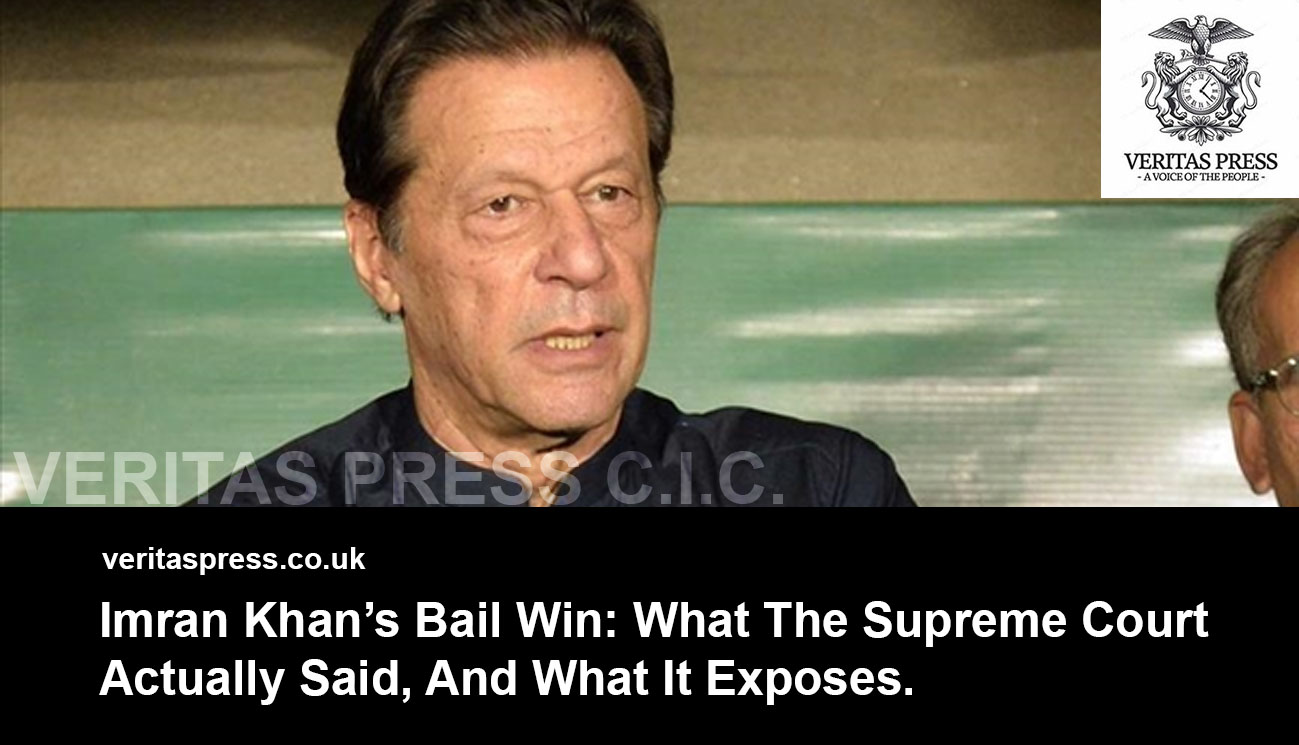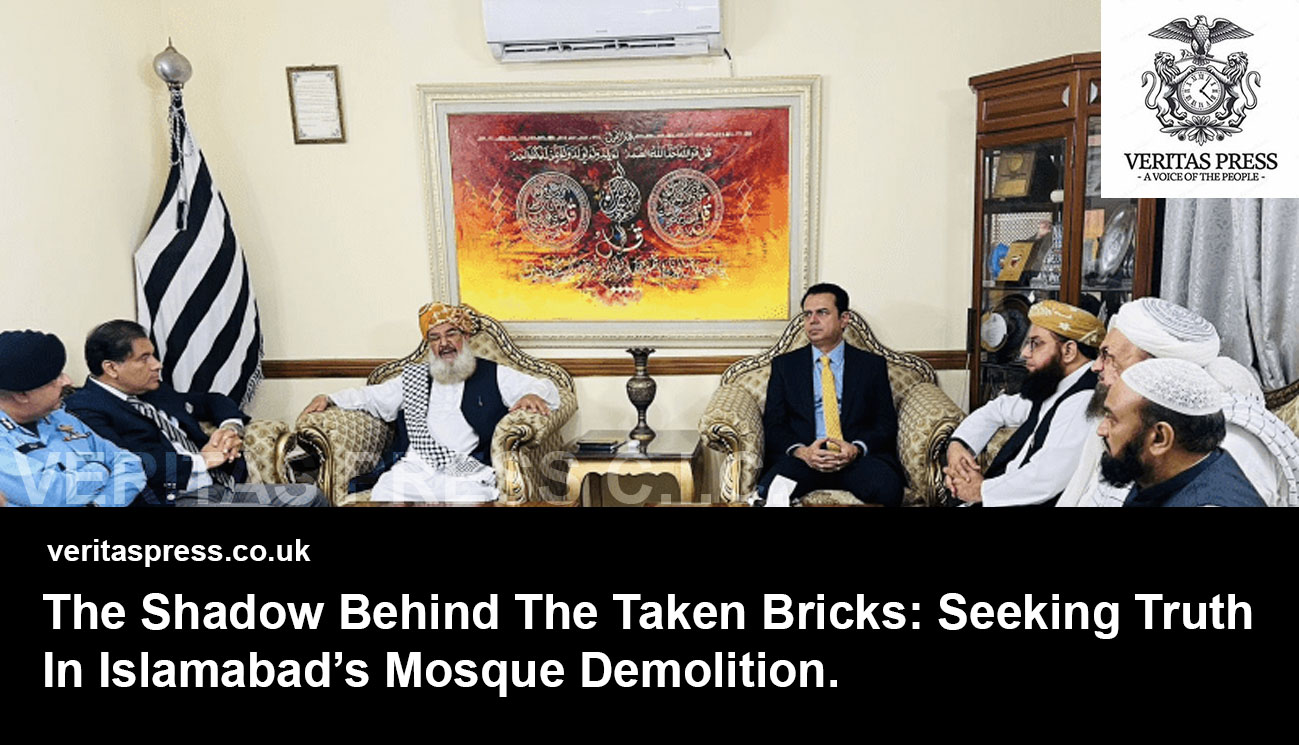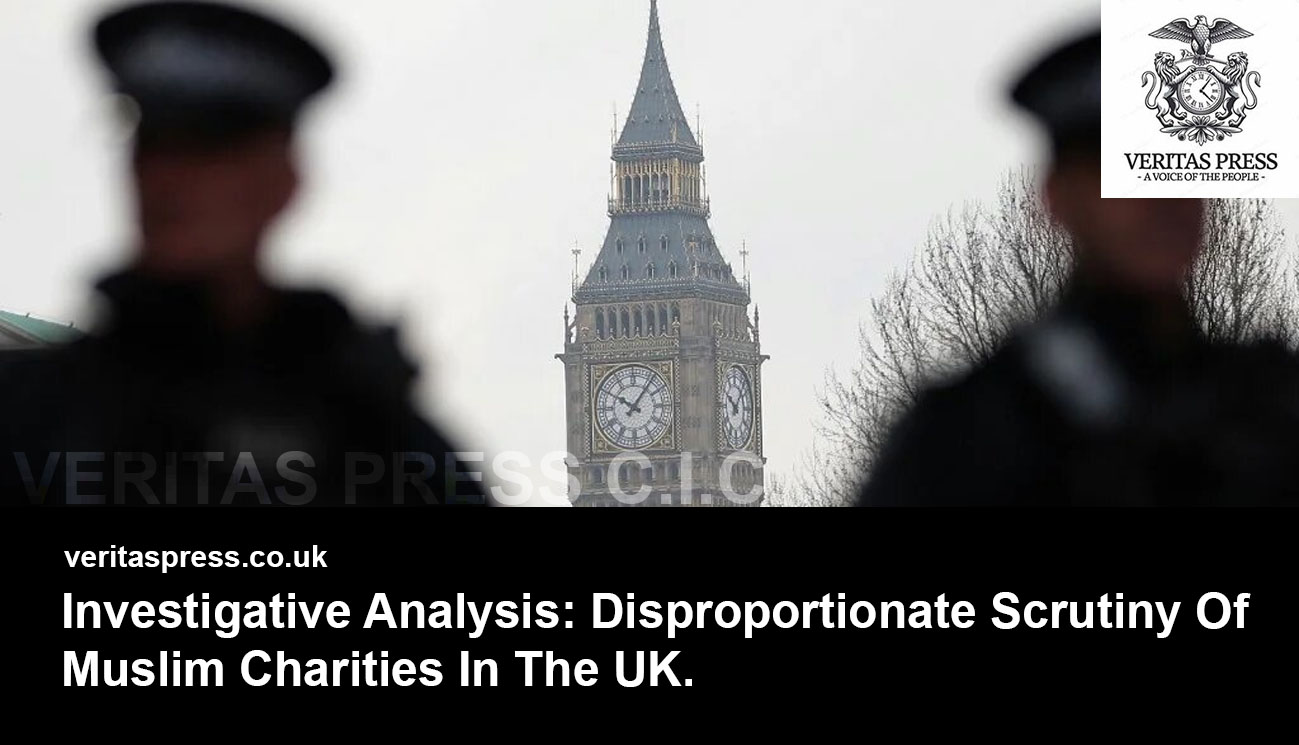Press Release: Veritas Press C.I.C. Author: Kamran Faqir Article Date Published: 15 Aug 2025 at 16:25 GMT Category: South Asia | Pakistan | Imran Khan’s Bail Source(s): Veritas Press C.I.C. | Multi News Agencies
The Core Ruling (And Why It Matters):
Pakistan’s Supreme Court granted Imran Khan bail in eight, May 9, 2023 cases on the principle of consistency, explicitly noting that similarly placed co-accused had already received bail. In a four-page order authored by Chief Justice Yahya Afridi, the bench stressed that bail proceedings should avoid merits to prevent contaminating trial findings. This is more than procedural housekeeping: it signals that the state’s theory of a centrally orchestrated “conspiracy” must meet the same threshold applied to others already out on bail.
Government messaging moved quickly to contain the narrative. Information Minister Attaullah Tarar cautioned that “bail does not mean acquittal,” emphasising Khan’s 14-year conviction in the Al-Qadir Trust graft case as the binding obstacle to release. The line is calibrated to underscore the continuity of punishment despite the bail optics.
Bottom line: Today’s order weakens (but does not collapse) the May 9 conspiracy scaffolding. It also creates appellate pressure for uniformity across co-accused, an area where investigative disparities have already drawn judicial comment.
What The Courtroom Exchange Revealed:
During arguments, the bench pressed prosecutors to show any Supreme Court precedent denying bail on “conspiracy” alone, and to explain how Khan’s case differed from others where the Court granted bail. The Court also rebuked attempts to argue on the merits at a bail stage. These are not semantic quibbles; they go to evidentiary sufficiency and prosecutorial discipline. The defence, led by Barrister Salman Safdar, pointed to the Ejaz Ahmed Chaudhry case and similar grants, ammunition for the consistency principle, the Court ultimately leaned on.
The Wider Rights Landscape: Patterns, Not Isolated Incidents.
The May 9 aftermath did not unfold in a vacuum. Credible monitors describe a patterned crackdown:
- Amnesty International documented mobile internet shutdowns, mass detentions, and opaque, sometimes lethal force against PTI-linked protests, placing the response within a broader trend of intolerance for assembly (and citing earlier clampdowns against Baloch and Pashtun protesters for continuity).
- Freedom House logged the enforced disappearance of journalist Imran Riaz during the May 2023 sweep, situating the episode in systemic constraints on expression and due process.
- The U.S. and U.K. criticised military-court convictions of civilians tied to the unrest, citing deficits in independence and transparency, pressure that directly questions the forum and fairness of key prosecutions.
Investigative inference: The rights-practice environment surrounding the May 9 prosecutions is adversarial to due process. Even if individual cases withstand scrutiny, the aggregate procedural context, shutdowns, custodial opacity, and military-court use erodes confidence that prosecutions are purely evidentiary rather than disciplinary/political.
The Al-Qadir Hinge: Why Bail Doesn’t Open The Door (Yet).
Khan cannot walk free because of the Al-Qadir Trust conviction (14 years for him; 7 years for Bushra Bibi). Prosecutors say a charity vehicle masked the acceptance of land from a developer tied to a £190m asset matter; PTI insists the land was for a non-profit educational institution and that the case is political. Whatever one’s view, this conviction, not the May 9 cases, remains the immediate barrier. Any near-term liberty scenario routes through appellate relief in Al-Qadir.
Are the allegations “false” or “null and void”?
It’s essential to separate law, evidence, and claims:
- Khan and the PTI characterise the cases as politically motivated; allies have alleged pressure campaigns to secure testimony (e.g., claims by Zulfi Bukhari). Those are defence assertions, not judicial findings.
- Courts have not declared the May 9 charges “false” or “null and void.” What they have done today is grant bail on consistency and caution against premature merits findings at the bail stage. That narrows prosecutorial leverage but does not equal acquittal.
- Conversely, the government’s narrative that the Al-Qadir conviction reflects “solid evidence in a transparent trial” is an executive characterisation; its durability will be tested on appeal under judicial, not political standards.
Fair characterisation for an investigative analysis:
- Human-rights concerns around Khan and PTI treatment are well-documented by independent monitors.
- Some cases have produced sentences for PTI supporters (including mass convictions), and others have seen bail or partial relief, creating a mixed judicial record rather than a categorical vindication of either side.
The Prosecutorial Burden From Here:
Today’s order implicitly raises the state’s bar in three ways:
- Specificity over narrative: Courts will expect granular, attributable acts by Khan beyond generalised “incitement” rhetoric, particularly where co-accused have bail.
- Civilian forum credibility: With allied governments objecting to military-court use for civilians, prosecutors face external and internal pressure to keep trials in ordinary courts with transparent due process.
- Procedural hygiene: Internet blackouts, custodial opacity, and mass detentions documented by rights groups are a litigation liability. Defence can (and will) argue due-process taint and seek exclusion of weakly sourced digital “conspiracy” evidence.
Political Stakes Behind The Law:
Even after a year of incarceration and more than a hundred cases at various points, Khan remains a live electoral and street-power force, which is precisely why prosecutorial overreach (or the perception of it) is politically costly. Moves to ban PTI, disqualify leaders, or continue mass prosecutions reinforce a rights-risk frame at home and abroad, inviting scrutiny that bleeds into markets and diplomacy.
What To Watch Next (Investigative Checklist):
- Certified Supreme Court order text and any reasoning beyond the oral pronouncement (today’s coverage cites a four-page order, watch for publication and any clarifying addenda).
- Appeal track in Al-Qadir (grounds, evidentiary disputes, handling of alleged coercion claims, and any relief pending appeal).
- Forum shifts: Are any remaining May 9 trials moved away from military courts under domestic or international pressure?
- Rights metrics: Internet shutdown incidents, treatment of detainees, and transparency of custody, indicators of whether the “crackdown” pattern is easing or hardening.
In Conclusion:
The Supreme Court’s decision to grant Imran Khan bail in eight May 9 riot cases is far more than a narrow legal reprieve; it is an indictment of the state’s prosecutorial posture and the political environment in which those prosecutions were born. By grounding its ruling in the principle of consistency, the Court implicitly acknowledged what critics of the government have argued since May 2023: that the cases against Khan and his party have been pursued not in the spirit of justice, but in the service of containment and political neutralisation.
The judiciary’s refusal to entertain prosecutorial attempts to argue the merits at the bail stage underscores a deeper point: much of the evidence put forward, social media clips, witness statements of questionable independence, and collective conspiracy theories, has yet to clear the threshold of credibility required in an impartial courtroom. The very need for the Chief Justice to ask whether any precedent exists where “bail was denied solely on conspiracy” suggests that these charges rest on an unstable legal footing.
At the same time, the broader environment in which these prosecutions are unfolding cannot be divorced from the verdict. The May 9 events were undoubtedly violent and unlawful, but the state’s sweeping response, thousands arrested, protesters tried in military courts, journalists disappeared, and entire cities silenced by internet shutdowns, reads less like due process and more like collective punishment. Human rights groups from Amnesty to Freedom House have consistently flagged these excesses, warning that Pakistan’s constitutional guarantees of assembly and fair trial are being eroded under the pretext of national security.
This matters because the credibility of any conviction, or indeed of any acquittal, depends on the fairness of the system that produces it. A trial conducted under the shadow of intimidation, blackout, and politicised prosecution will never command legitimacy, no matter how strong the evidence. In Khan’s case, the Al-Qadir Trust conviction remains the principal barrier to his release. Yet that too is clouded by allegations of political interference, selective application of anti-graft laws, and a wider campaign designed to exile him from Pakistan’s political stage.
The deeper critique, then, is that Pakistan’s governance has reached a point where the distinction between law and politics, between justice and expediency, has collapsed. Khan’s legal troubles are real, but they are inseparable from a climate in which opposition voices are muzzled, street movements criminalised, and political dissent equated with treason. The precedent being set is corrosive: that courts, police, and prosecutors can be mobilised as tools of regime survival rather than neutral arbiters of justice.
If left unchallenged, this trajectory risks institutionalising authoritarian methods under a democratic façade. Today, it is Imran Khan and his PTI who face mass trials, rights violations, and the blunt weapon of legal engineering. Tomorrow, the same machinery could be turned against any dissenting political force. In that sense, the May 9 cases are not just Khan’s battle; they are a test of whether Pakistan’s courts will remain a sanctuary of law or become another arena of political theatre.
The Supreme Court’s ruling signals a sliver of resistance to that trend. But unless the state’s approach changes, embracing transparency, adhering to due process, and dismantling the apparatus of coercion, the “justice” meted out to Khan and his supporters will remain tainted in the eyes of history. The verdict has not vindicated Khan, but it has illuminated the fragility of Pakistan’s democratic institutions and the cost of weaponising law against politics.




























Leave a Reply